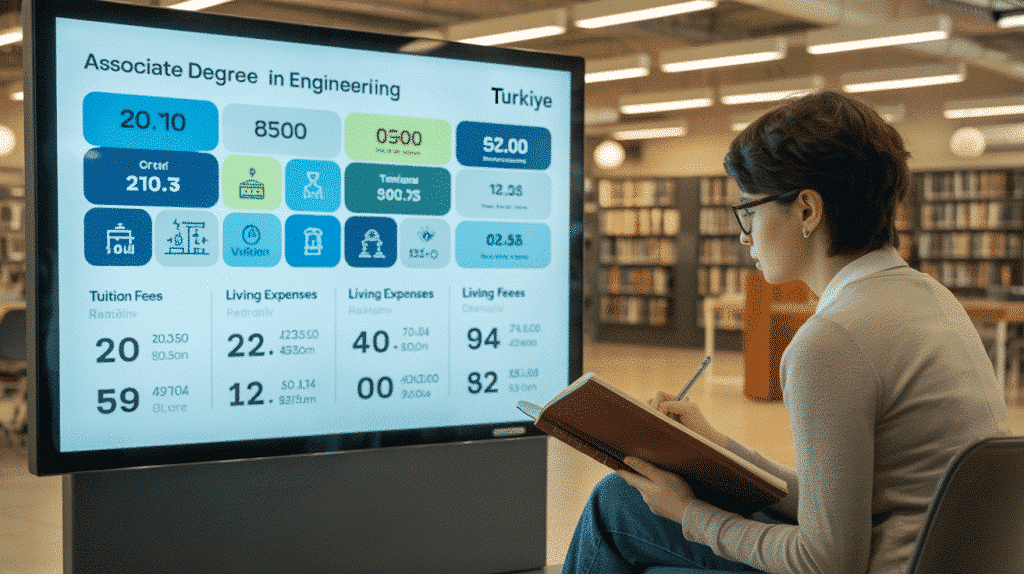Cost Breakdown for an Associate Degree in Engineering in Turkiye
Introduction
Studying engineering in Turkiye has gained significant popularity among international students due to its affordable tuition rates and high-quality education. In response to increasing interest, we will explore the cost breakdown associated with pursuing an associate degree in engineering in Turkiye. Understanding the financial requirements can help prospective students make informed decisions about their educational paths, particularly as they evaluate options between public and private institutions.
Overview of Costs
The cost of obtaining an associate degree in engineering in Turkiye depends primarily on the type of institution (public vs. private) and the city in which the university is located. This section outlines the key factors influencing tuition fees and associated costs for students.
Tuition Fees
Public Universities
Public universities in Turkiye often offer the most affordable education. Tuition fees for engineering programs typically range from $1,000 to $2,000 per academic year. These institutions are particularly appealing to both domestic and international students looking for a budget-friendly option.
Private Universities
For those considering private universities, tuition fees can start at around $2,200, reaching up to $9,500 per year depending on the institution and the specific engineering program. While these universities may offer additional resources and courses in English, they come with a premium cost.
Fee Examples by University (Engineering-Related Fields)
| University | Annual Tuition Fee (USD) | Program Language |
|---|---|---|
| Istanbul Aydin University | From $6,500 (Civil Engineering) | English |
| Bahcesehir University | $9,000 (Civil Engineering) | English |
| Nisantasi University | $3,850 (Civil Engineering) | Turkish |
Note: As these figures pertain to bachelor’s degrees in engineering, associate degree programs generally fall towards the lower end of this tuition range, especially at public institutions.
Other Associated Costs
While tuition fees are a primary concern, students should also consider additional expenses that contribute to the overall cost of studying in Turkiye:
- Application Fees: Some universities may require a non-refundable application processing fee, typically between $50 to $100.
- Student Visa and Residence Permit: International students must factor in visa-related costs, which can vary by individual circumstances.
- Textbooks and Materials: Students can expect to spend approximately $200 to $500 per year on textbooks and course materials, depending on their specific engineering specialization.
- Living Expenses: The estimated monthly living costs range from $400 to $800, which covers accommodation, food, transportation, and personal expenses. Major cities like Istanbul and Ankara tend to be on the higher end of this spectrum.
Summary Table: Estimated Annual Cost (USD) for Associate Degree in Engineering
| Cost Component | Public University | Private University |
|---|---|---|
| Tutition Fees | $1,000 – $2,000 | $2,200 – $9,500 |
| Application Fees | $50 – $100 | $50 – $100 |
| Living Expenses | $4,800 – $9,600 | $4,800 – $9,600 |
| Textbooks/Materials | $200 – $500 | $200 – $500 |
| Miscellaneous | $200+ | $200+ |
| Total (Annual) | ~$6,250 – $12,400 | ~$7,450 – $19,900 |
These totals are estimated and can vary significantly based on factors like location, lifestyle choices, and specific university policies.
Key Points for International Students
- Tuition Fee Variation: While public universities offer significantly lower tuition fees, many programs may be taught in Turkish. Hence, knowledge of the language might be necessary for non-Turkish speakers.
- Program Choices: Private universities provide a wider range of programs taught in English, appealing to international students who may not speak Turkish but come with higher costs.
- Scholarship Availability: Many universities in Turkiye offer scholarships and financial aid opportunities that can considerably lessen the financial burden on students. Prospective students should explore these options during their application process.
More on Studying in Turkiye
For those considering an international education experience, it is essential to think about the advantages Turkiye has to offer:
- Quality Education: Institutions such as Medipol University and Uskudar University are recognized for their esteemed engineering programs.
- Cultural Integration: Studying in Turkiye allows students to experience a vibrant culture bridging Europe and Asia, enhancing their educational journey.
- Strong Industry Links: Universities in Turkiye often maintain strong connections with local industries, offering students hands-on experiences and job placement opportunities post-graduation.
Conclusion
Turkiye presents an attractive and economically viable option for international students pursuing an associate degree in engineering. With lower tuition rates at public universities and a diverse range of programs offered at private institutions, the financial landscape is favorable compared to many other countries. However, prospective students should conduct detailed research on tuition, living expenses, and available scholarships to make the most financially sound decision.
If you are an international student recruiter, an HR professional, or part of a university admissions team interested in collaborating or seeking information about the educational landscape in Turkiye, we invite you to contact us for partnership opportunities. Together, we can help guide more students to the promising academic programs available in Turkiye.
Take the Next Step with Study in Turkiye
Explore further about studying in Turkiye and make informed decisions about your educational journey.

